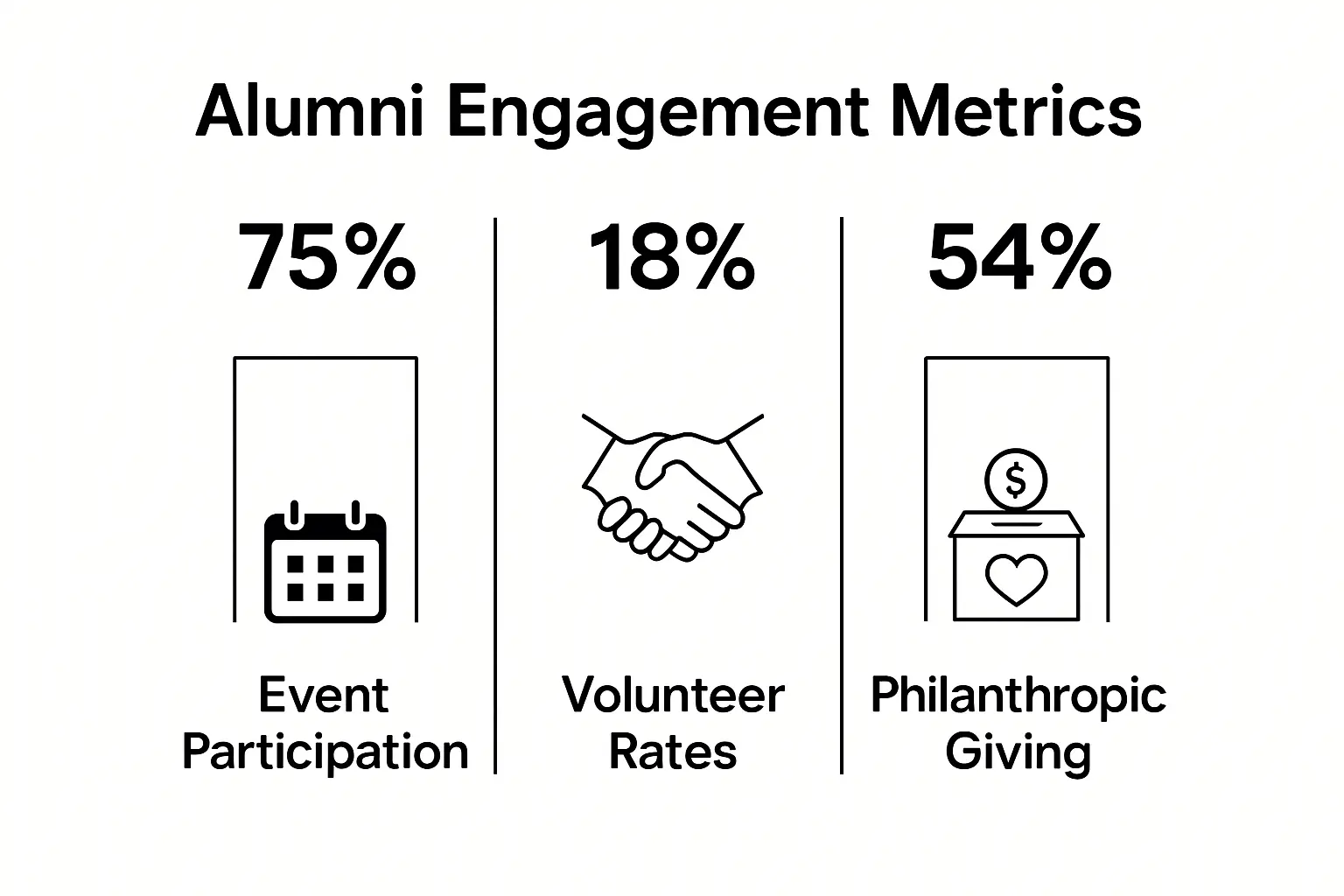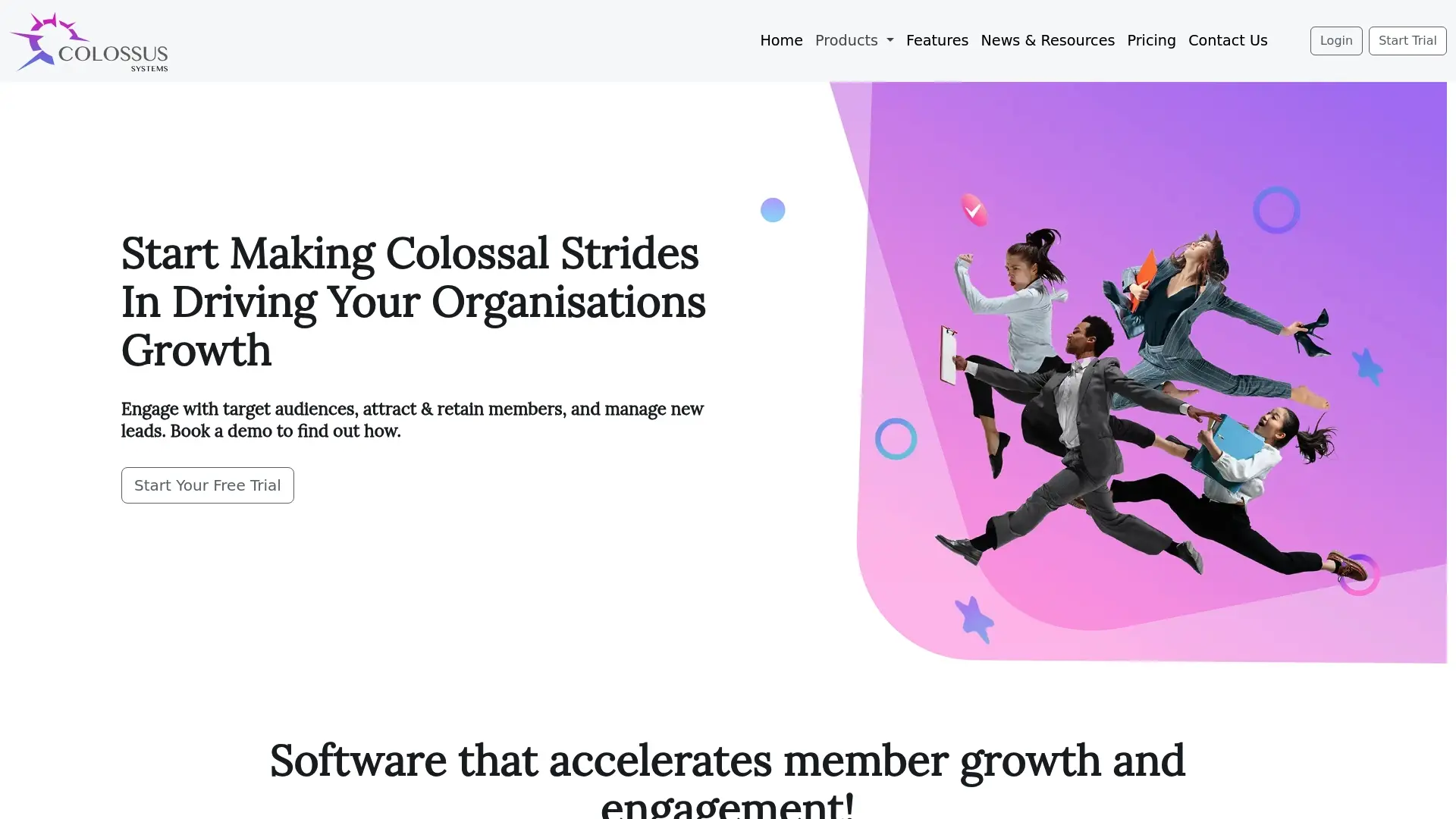Understanding Alumni Engagement Strategies for Success

Universities spend countless hours nurturing connections with their former students and graduates and it is not just about tradition. Research shows that engaged alumni can boost job placement rates and bring in valuable mentorship for current students. Most think these connections are built on nostalgia and occasional reunions. In reality the smartest institutions use deliberate alumni engagement strategies that turn old classmates into lifelong allies driving real progress and opportunity for everyone.
Table of Contents
- What Are Alumni Engagement Strategies And Their Importance?
- The Role Of Effective Communication In Alumni Engagement
- Building Community: The Importance Of Networking Within Alumni
- Leveraging Technology For Enhanced Alumni Engagement
- Evaluating The Impact Of Alumni Engagement Strategies
Quick Summary
| Takeaway | Explanation |
|---|---|
| Alumni engagement builds lasting relationships | Developing long-term ties benefits both the institution and graduates, enhancing networks and support. |
| Effective communication fosters engagement | Utilising diverse communication channels creates valuable interactions that resonate with alumni’s interests and needs. |
| Networking drives community strength | Strategic networking opportunities facilitate professional growth and improve institutional ties, transforming alumni into interconnected professionals. |
| Technology enhances engagement methods | Implementing advanced digital tools creates personalised experiences, enriching alumni interactions and relationships with the institution. |
| Measure engagement impact strategically | A balanced evaluation framework captures the true value of alumni relationships, guiding future engagement activities for better outcomes. |
What Are Alumni Engagement Strategies and Their Importance?
Alumni engagement strategies represent systematic approaches organisations use to maintain meaningful connections with former students, graduates, and institutional members. These comprehensive strategies go beyond simple communication, creating pathways for sustained interaction, support, and mutual growth between educational institutions and their alumni networks.
Understanding Alumni Engagement Core Principles
At its foundation, alumni engagement focuses on building long term relationships that provide value to both the institution and its graduates. Discover our comprehensive guide on community connection tactics to understand how strategic engagement works.
The primary objectives of alumni engagement strategies include:
- Maintaining institutional reputation and brand advocacy
- Creating professional networking opportunities
- Supporting ongoing learning and career development
- Generating potential financial contributions and scholarships
Strategic Importance in Institutional Growth
According to research from EDUCAUSE, alumni engagement serves critical functions beyond nostalgic connections. Engaged alumni provide substantial benefits including:
- Mentorship programmes for current students
- Improved job placement networks
- Curriculum feedback mechanisms
- Financial support through donations and sponsorships
Successful alumni engagement requires a multifaceted approach that recognises the diverse needs and interests of graduates across different career stages and professional backgrounds. By developing personalised communication strategies, institutions can transform alumni from passive recipients of newsletters into active, committed community members who contribute meaningfully to organisational growth and student success.
To help clarify the key objectives and benefits of alumni engagement strategies, the table below provides a comparison between the core principles and their direct institutional value:
| Alumni Engagement Principle | Institutional Benefit |
|---|---|
| Maintaining institutional reputation and advocacy | Enhances brand image and attracts future students |
| Creating professional networking opportunities | Improves job placement and career progression |
| Supporting ongoing learning and career development | Fosters alumni loyalty and lifelong learning partnerships |
| Generating financial contributions and scholarships | Supports scholarships, campus initiatives, and development |
| Providing mentorship programmes | Assists current students and strengthens alumni ties |
| Receiving curriculum feedback | Keeps programmes relevant and industry-aligned |
The Role of Effective Communication in Alumni Engagement
Effective communication serves as the foundational pillar of successful alumni engagement strategies, transforming institutional connections from transactional interactions to meaningful, long lasting relationships. By implementing sophisticated communication approaches, organisations can create powerful networks that benefit both alumni and the institution.
Communication Channel Diversity
Learn about advanced digital communication techniques that can revolutionise alumni interactions. The most successful alumni engagement programmes leverage multiple communication channels to reach diverse graduate populations, recognising that different generations and professional groups prefer varied communication methods.
Key communication channels include:
- Email newsletters with personalised content
- Social media platforms targeting specific age groups
- Professional networking websites
- Virtual and physical alumni events
- Targeted digital publications
Strategic Communication Principles
According to research from EDUCAUSE, strategic communication goes beyond simple information sharing. Successful approaches focus on creating value driven interactions that resonate with alumni’s professional and personal interests.
Effective communication strategies should:
- Demonstrate genuine institutional investment in alumni success
- Provide relevant professional development resources
- Highlight alumni achievements and institutional pride
- Create opportunities for meaningful two way dialogue
By adopting a nuanced, multifaceted communication approach, institutions can transform alumni relationships from occasional updates to vibrant, mutually beneficial professional communities that support continuous learning and growth.
The following table presents an overview of the primary communication channels used in modern alumni engagement, along with their key purposes and targeted alumni segments:
| Communication Channel | Main Purpose | Typical Target Audience |
|---|---|---|
| Email newsletters | Share personalised updates & news | All alumni generations |
| Social media platforms | Build engagement & instant feedback | Younger graduates, broad network |
| Professional networking sites | Facilitate career opportunities | Mid-career and senior alumni |
| Virtual/physical events | Encourage direct interaction | All alumni, event participants |
| Digital publications | Provide targeted industry content | Alumni with specific interests |
Building Community: The Importance of Networking within Alumni
Networking represents the cornerstone of meaningful alumni engagement, transforming disconnected graduates into a powerful, interconnected professional ecosystem. By creating strategic opportunities for interaction, institutions can foster robust communities that transcend traditional alumni relationships.
Networking as Institutional Value Creation
Explore innovative event marketing strategies for building connections that can strengthen alumni networks. The most successful networking approaches recognise that connections are not merely social interactions but strategic pathways for professional growth and institutional advancement.
Key objectives of alumni networking include:
- Facilitating professional mentorship opportunities
- Enabling career development and job placement
- Supporting knowledge exchange across generations
- Creating collaborative professional platforms
Multidimensional Networking Strategies
According to research from Career Development Experts, contemporary networking strategies leverage both digital and physical platforms to create comprehensive engagement experiences.
Effective networking strategies should:
- Utilise multiple communication channels
- Create targeted professional interest groups
- Develop both online and offline interaction opportunities
- Provide structured networking frameworks
By developing sophisticated, multifaceted networking approaches, institutions can transform alumni connections from passive alumni lists into dynamic, mutually beneficial professional communities that drive continuous personal and organisational growth.

Leveraging Technology for Enhanced Alumni Engagement
Technology has revolutionised alumni engagement, providing sophisticated tools that transform traditional interaction models into dynamic, data driven relationship management systems. Modern technological solutions enable institutions to create personalised, responsive experiences that adapt to graduates’ evolving professional and personal needs.
Digital Platforms and Interaction Mechanisms
Discover strategies for improving member engagement that leverage cutting edge technological approaches. Digital platforms now offer comprehensive ecosystems that facilitate multifaceted interactions beyond simple communication channels.
Key technological engagement tools include:
- Artificial intelligence powered networking platforms
- Machine learning alumni recommendation systems
- Interactive mobile applications
- Virtual event and webinar technologies
- Cloud based alumni management systems
Strategic Technology Implementation
According to research from the US Department of Education, successful technological integration requires a strategic approach that balances technological innovation with human centred design. Effective digital engagement transcends mere technological implementation, focusing on creating meaningful, personalised experiences.
Critical considerations for technological alumni engagement include:
- Ensuring user friendly interface designs
- Protecting alumni data privacy
- Creating seamless cross platform experiences
- Developing adaptive communication algorithms
By embracing technological solutions with a nuanced, strategic perspective, institutions can transform alumni relationships from transactional interactions to sophisticated, data informed professional networks that provide continuous value to both graduates and educational organisations.
For a clear summary of how technology shapes alumni engagement, the table below lists key technological tools and critical considerations for their effective implementation:
| Technological Tool | Primary Use | Critical Implementation Consideration |
|---|---|---|
| AI-powered networking platforms | Facilitate smart connections | Data privacy protection |
| Machine learning recommendation systems | Personalise alumni experiences | User-friendly and intuitive interfaces |
| Interactive mobile applications | Enable engagement on-the-go | Seamless cross-platform integration |
| Virtual event and webinar technology | Host remote engagement activities | Accessibility for diverse alumni groups |
| Cloud-based management systems | Centralise alumni data and communication | Security and adaptive updates |
Evaluating the Impact of Alumni Engagement Strategies
Measuring alumni engagement effectiveness requires sophisticated, multidimensional approaches that go beyond traditional quantitative metrics. Institutions must develop comprehensive frameworks that capture the nuanced value of alumni relationships across professional, philanthropic, and institutional dimensions.
Comprehensive Measurement Frameworks
Explore effective community engagement tactics that provide insights into strategic impact evaluation. Modern engagement assessment requires holistic perspectives that integrate multiple performance indicators.
Key measurement dimensions include:

- Experiential engagement levels
- Volunteer participation rates
- Philanthropic contribution patterns
- Communication interaction frequencies
- Professional network development metrics
Strategic Impact Assessment
According to research from Tufts University’s Strategic Alumni Engagement Plan, meaningful engagement correlates directly with institutional support. Strategic evaluation focuses on understanding how different engagement activities translate into tangible institutional benefits.
Critical evaluation considerations encompass:
- Tracking alumni event participation
- Measuring mentorship programme effectiveness
- Analysing professional networking outcomes
- Quantifying financial contributions
- Assessing long term institutional brand perception
By developing nuanced, data driven evaluation strategies, institutions can transform alumni engagement from subjective interactions into measurable, strategic partnerships that generate continuous value for both graduates and educational organizations.
Transform Your Alumni Engagement Strategy with Colossus Systems
If building meaningful and long-term alumni connections feels overwhelming or resource intensive, you are not alone. Alumni teams often struggle to maintain relevant communications, organise impactful events, and deliver personalised experiences that support both graduate and institutional growth. The article highlighted just how crucial it is to move beyond basic interactions towards a multi-channel, technology-driven, and data-informed approach. Colossus Systems empowers you to solve these exact challenges by offering an all-in-one SaaS platform designed to streamline event planning, alumni management, digital communications, and analytics. Our tools help you create vibrant alumni networks, boost professional engagement, and measure every aspect of your strategy with ease. See how you can put these ideas into action by visiting Colossus Systems.

Take your alumni engagement from fragmented to future-ready. Experience our comprehensive solutions now and discover how you can achieve measurable growth through smarter communication, efficient event management, and targeted marketing. Start fostering deeper alumni relationships today by exploring our platform.
Frequently Asked Questions
What are alumni engagement strategies?
Alumni engagement strategies are systematic approaches used by organisations to maintain meaningful connections with former students and graduates, focusing on building long-term relationships that provide value to both the institution and its alumni.
Why is effective communication important in alumni engagement?
Effective communication transforms institutional connections from transactional interactions into meaningful relationships, supporting engagement through personalised communication, diverse channels, and value-driven interactions.
How can networking enhance alumni engagement?
Networking enhances alumni engagement by creating opportunities for professional mentorship, knowledge exchange, and collaborative platforms, thus transforming disconnected graduates into a powerful professional ecosystem.
What role does technology play in alumni engagement?
Technology revolutionises alumni engagement by providing tools that facilitate personalized, responsive experiences. Digital platforms enable multifaceted interactions and data-driven relationship management to better meet the evolving needs of alumni.